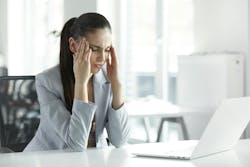A few days ago, I felt a familiar dull ache behind my eyes. A migraine was brewing. I took my prescription and tried all my usual coping strategies, but nothing helped. I had no alternative, so I pushed through until I could turn in for the night.
Even as I lay in bed, with a pounding pulse of pain, all I could do was worry: Will my old car last until I finish paying off my student loans? Is the tree in the front yard healthy or diseased? Can we really redo the deck ourselves? How will I finish everything for our next issue before our deadline?
That night, I dreamt that I woke up with my feet were covered in blisters. I immediately sought medical attention because I couldn’t put my shoes on, let alone walk. Even while dreaming, I knew I needed to stop everything to take care of this health issue. It seems my unconscious self is unfortunately better at prioritizing my health than my conscious self.
I woke up the next morning still feeling crummy, and I realized I once again made myself sick with worry. Our physical pain might be the result of an injury (i.e., a pulled muscle), but it can also be the result of something happening inside our heads.
I’ve read enough forums and health articles over the years to know that stress and other mental health issues can present as a physical pain or illness. Some people have reported getting a cold with a fever before a business trip, others have reported getting stomachaches before a big exam, and others have reported vertigo and chest pain as a result of a stressful workplace.
It’s easy to push aside our worries, but just because we ignore them doesn’t mean they go away. Our bodies will still experience and process these emotions. If we choose to ignore them, they will manifest in one form or another.
Our bodies are a system. Everything is interconnected, and we need to take care of our whole selves in order to be healthy.
The past few years have demonstrated the effects our mental health can have on our physical health and overall well-being. In the first year of the pandemic, the global prevalence of anxiety and depression (which were already the most common mental disorders globally) increased by 25%, according to the World Health Organization (WHO).
“The information we have now about the impact of COVID-19 on the world’s mental health is just the tip of the iceberg,” said WHO Director-General Dr. Tedros Adhanom Ghebreyesus back in 2022. “This is a wake-up call to all countries to pay more attention to mental health and do a better
job of supporting their populations’ mental health.”
In 2023, U.S. Surgeon General Dr. Vivek Murthy released a new advisory on an epidemic of loneliness and isolation in our country. Even before the pandemic, about half of U.S. adults reported experiencing measurable levels of loneliness. The shutdowns and social distancing made it even worse.
I keep thinking about Joyce Sunada’s quote: “If you don’t make time for your wellness, you will be forced to make time for your illness.”
I’m not aware of any situation where stress can’t trigger or exacerbate an illness, disease or condition. So, if we want to focus on improving our health and well-being, we must also take stress seriously. In other words, we have to address the cause rather than trying to treat the symptoms.
I’m pragmatic to a fault. I know we all experience busy seasons and that obligations still need to be met—even when you’re not feeling well.
It’s easy to carry the weight of the world on your shoulders, but it’s important to remember that you can ask for help. You can ask for an extension. You can ask for grace, both from others and yourself.
I’ve been asking myself this question the past few days: What can I do to make myself less stressed? My answer may change by the hour, but it’s comforting to remember that each decision I make is with the goal of prioritizing my health.
Stress is one of my migraine triggers. I can only take three doses of my medication per week, so I must reduce my stress to avoid getting sidelined by migraines. Otherwise, I won’t be able to take care of myself—or others.
As safety professionals, it’s easy to focus on other peoples’ needs. That’s a noble effort, but you must also take care of yourself. If you don’t, your body will force you to, and that’s
dangerous for everyone.
About the Author
Nicole Stempak
Nicole Stempak is managing editor of EHS Today and conference content manager of the Safety Leadership Conference.

